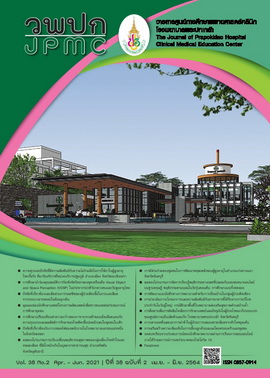CPIRD Medical Students’ Perspective on Experience of Community Fieldwork
Main Article Content
Abstract
BACKGROUND: The Family and Community Medicine curriculum provides medical students with knowledge acknowledges the importance of community lifestyle related to health, and the ability to identify community health issues to guide clinical practice in the future. However, the learning outcomes might not be able to show that the curriculum is particularly appropriate for its’ objective especially when it comes to comprehension of the role of doctors in the community.
OBJECTIVES: To explore medical students’ perspectives on experience of community fieldwork in Family and Community Medicine I.
METHODS: A qualitative study using in – depth interviews was carried out. Fourteen 4th year medical students at Sawanpracharak Hospital Medical Education Center participated in the study. Snowball sampling with questionnaires was used and thematic analysis and data triangulation were assessed to identify themes.
RESULTS: Community fieldwork is an important role of physicians because it is useful in disease prevention and promotion of good health care. However, it is not necessary for doctors to take over every step, as physicians may only analyze or plan to solve community problems. Medical students understand the principles and methods of community education using 7 tools from hands-on practice rather than classroom teaching. From the interviews, the diversity of community, roles of community volunteers, primary care unit nurses and guidance from supervisors have an influence on medical students’ learning. There are three main outcomes from the medical students’ placement in the community 1) understanding people and patients more holistically, 2) being positively inspired to become a good doctor in the future, and 3) gaining opportunity to practice soft skills, work as part of a multidisciplinary team, and apply careful listening skills.
CONCLUSIONS: Most medical students are community minded and understand how to link the community and it’s people’s health & illness. Mostly, they receive benefits from non - technical skills rather than medical knowledge. The Medical Education Center should arrange community fieldwork in a real - life practical way of learning and should also have relevant supporting factors in learning.
Article Details
References
Office of Collaborative Project to Increase Production of Rural Doctor. History of CPIRD [Internet]. 1994 [cited 2020 Jun 30]. Available from : https://www.cpird.in.th/index/site/1
Chantharakhit C, Sujaritvanichpong N. Evaluation factors may affect the goals of a doctor's life of medical students in Medical Education Center Buddhasothorn Hospital. J Prapokklao Hosp Clin Med Educat Center. 2020; 37:26-34.
Sawanpracharak Hospital Medical Education Center. Doctor of medicine program. Nakhonsawan: Sawanpracharak Hospital Clinical Medical Education Center , 2013.
Sawanpracharak Hospital MedicalEducation Center. Handbook of Family and Community Medicine Iof 2019 academic year. Nakhonsawan: Education service section of Sawanpracharak Hospital Clinical Medical Education Center, 2019.
Chuengsatiansup K. Community way: 7 tools formade community fieldwork easy, practical and fun. 12 thed. Nontaburi: Suksala; 2016.
Tooprakai D. Community learning to research project [Internet]. 2015 [cited 2020 Aug 25]. Available from: http://mec-lp.com/img-award/qa58.pdf

